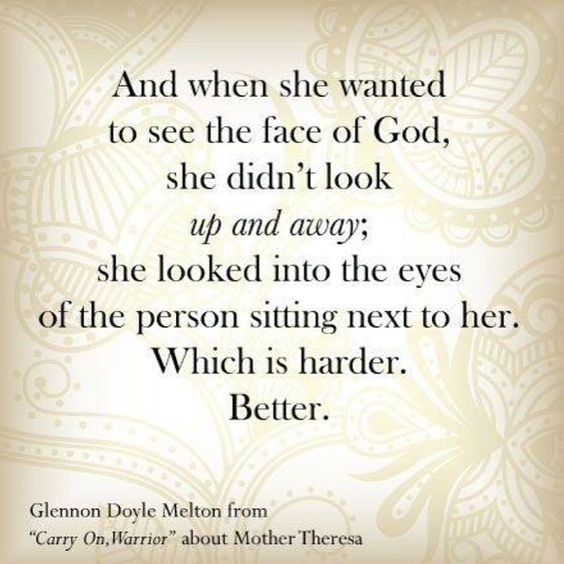Lenten Devotional – THURS, Mar 18: SEE (revisited)
Who has seen Godself? How do we see God? Do we see Godself in human form, as described here, or as something else?
In scripture, few people could come directly into the presence of Godself. The great prophet Moses did so. Others could not look upon the radiance of his face afterward. A few other Biblical prophets also reported meeting God in person.
Famously, in Hebrew Scriptures, Jacob wrestled with a stranger at night on his way to Canaan. Though dawn was approaching, neither person could prevail. Jacob refused to give up the struggle, so the stranger touched his hip, and hi joint came out of place. Afterward Jacob limped. By remaining stubbi=orn and continuing to wrestle, he won for himself a blessing and the new name Israel. Jacob named the place by the river where he had wrestled with Godself Peniel or Penuel. (פְּנוּאֵל) Trabnslated, this means “face of God” or “facing God”.
Later, in a tender passage, Jacob then says to his brother Esau, “For I have, after all, seen your face, as one sees the face of God…” He sees Godself in his sibling’s face. It is a fleeting experience. The connection doesn’t endure, perhaps because humans cannot sustain such awareness in each other’s company. Theologian Steve Watson writes, “He has just had this profound spiritual experience – he knows a thing or two about seeing the face of God. And he looks at his brother, face to face, and thinks that is what is happening. To see you accepting me, for us to be at peace – without walls, without fear, person to person, is for me to see in your face the face of God. … this proves to be too much. The intimacy of full personhood, brother to brother, is somehow so unfamiliar, so threatening, that within a day, he’s moved on… But for a moment, he had that connection, that peace to see the face of God in his brother.”
Yet for a brief time, they both experienced a profound sense of once more being in God’s company. They found God in each other.
Of course, the followers of Jesus walked in the embodied presence of the child of God. Most Christians recognize him as part of the holy trinity: Godself.
Jesus also, powerfully, reminded people that when they attended to the needs of others, they attended to the needs of God. They met Jesus in the form of other people to whome they offered compassion. How often, then, might you have been meeting the needs of Godself, even sat or kept vigil in the presence of Godself, by responding to human needs?
In our times, how do we see Godself in the world around us?
Has any person ever brought you into the presence of God? Perhaps at thesholds, such as birth or death, or life moments such as making promises to each other?
Or have you, like Moses, find Godself out in nature? On top of a mountain? Inside the the branches of a bush? At the ocean’s edge? In a quiet woodland? A spring meadow? A winter storm? A summer rainfall? In the midst of birdsong? Surrounded by wild creatures? In the presence of your own pet?
Remember that Godself saw your face first. And loved you, even if you didn’t recognize Godself. — Rev Gail
MEDITATIONS
Trust and value your own divinity as well as your connection to nature. Seeing God’s work everywhere will be your reward. — Wayne Dyer
Love is seeing God in the person next to us, and meditation is seeing God within us. Votes: — Sri Sri Ravi Shankar
Never lose an opportunity of seeing anything beautiful, for beauty is God’s handwriting. — Ralph Waldo Emerson
Seeing God face to face is to feel that He is enthroned in our hearts even as a child feels a mother’s affection without needing any demonstration. — Mahatma Gandhi
Challenge or Question: Where do you experience God’s self-revelation in the world?
Lenten Devotional – TUESDAY, Mar 16: HEART
The ‘heart’ is the source of purity in this Beatitude. We might translate it as inner attentiveness to ethical intentions and spiritual seeking. And how this mindfulness shapes our outward actions. It involves cultivation of a faithful spiritual life. Richard Rohr observes, ‘When the heart is right, Jesus says, seeing will be right. He ties together heart and sight.’
The heart becomes a lens that directs perception and offers a focal point. The Expositor’s Greek commentary says, ‘That purity is in the heart, the seat of thought, desire, motive, not in the outward act, goes without saying from Christ’s point of view.’ As mentioned in yesterday’s reflection, mindfulness heightens the sense of the pure in heart. Others might miss the revelations that are available to those who become single-minded or whole-hearted in their quest to follow Godself.
In some faith traditions, such as the Sufi tradition, practitioners strive to immerse themselves in the presence of Godself, to lose all sense of boundaries and become deeply connected to the eternal. Such an experience may be fleeting, yet it is life-defining. Knowing Godself — or objectively to reach enlightenment — is the sole ambition of mystics and seekers across many traditions of the world.
The pure of heart, in this blessing, are promised to see God. This is, indeed, to attune oneself to a revelation that is beyond the reach of most people, since we’re distracted and Godself remains veiled from us, unless we pay attention. — Rev Gail
MEDITATIONS:
The awakened heart and mind can be experienced as clarity itself, pure knowing. — Jack Kornfield
Grown men can learn from very little children for the hearts of little children are pure. Therefore, the Great Spirit may show to them many things which older people miss. — Black Elk
… it almost surprised me the other day when something was said about the “fundamentals of the Christian faith,” and I thought to myself—“I think I know what those are.” Love God. Love people. It seems so simple and so obvious, but it took me three years of serious doubt, two years of study, an ongoing sense of skepticism, a trip to India, a blog, and a book to really figure this out for myself. … Love is fundamental. It’s more important than being right. It’s more important than having all our theological ducks in a row. It’s more important than any commitment to absolute truth or a particular hermeneutic or a “high view” (read: “my view”) of sovereignty or the Bible or faith or the Church. — Rachel Held-Evans
Blessed are the agnostics. Blessed are they who doubt. Those who aren’t sure, who can still be surprised. Blessed are they who are spiritually impoverished and therefore not so certain about everything that they no longer take in new information. — Nadia Bolz-Weber
Perhaps pure reason without heart would never have thought of God. — Georg C. Lichtenberg
Challenge or Question: What spiritual practices have you used, that you find you desire to continue, that support bringing your whole heart into connection with God?
Worship on Martin Luther King Jr Weekend
Full Worship:
Reflection: Work of Peace – Doves at Work


